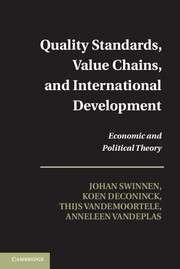Book contents
- Frontmatter
- Contents
- Preface and Acknowledgments
- 1 Introduction
- 2 Modeling Standards
- 3 Efficiency and Equity Effects of Standards
- 4 The Political Economy of Standards and Development
- 5 International Trade and Standards
- 6 Risk, Externalities, and the Nature of Standards
- 7 Endogenous Private and Public Standards in Value Chains
- 8 Butterflies and Political Economy Dynamics in Standard Setting
- 9 The Political Economy of Standards and Inclusion in Value Chains
- 10 Standards, Production Structure, and Inclusion in Value Chains
- 11 Standards, Market Imperfections, and Vertical Coordination in Value Chains
- 12 Market Power and Vertical Coordination in Value Chains
- 13 Price Transmission in Value Chains
- 14 Commodity Characteristics and Value Chain Governance
- 15 Economic Liberalization, Value Chains, and Development
- 16 Standards and Value Chains with Contracting Costs: Toward a General Model
- 17 General Equilibrium Effects of Standards in Value Chains
- References
- Index
10 - Standards, Production Structure, and Inclusion in Value Chains
Published online by Cambridge University Press: 05 August 2015
- Frontmatter
- Contents
- Preface and Acknowledgments
- 1 Introduction
- 2 Modeling Standards
- 3 Efficiency and Equity Effects of Standards
- 4 The Political Economy of Standards and Development
- 5 International Trade and Standards
- 6 Risk, Externalities, and the Nature of Standards
- 7 Endogenous Private and Public Standards in Value Chains
- 8 Butterflies and Political Economy Dynamics in Standard Setting
- 9 The Political Economy of Standards and Inclusion in Value Chains
- 10 Standards, Production Structure, and Inclusion in Value Chains
- 11 Standards, Market Imperfections, and Vertical Coordination in Value Chains
- 12 Market Power and Vertical Coordination in Value Chains
- 13 Price Transmission in Value Chains
- 14 Commodity Characteristics and Value Chain Governance
- 15 Economic Liberalization, Value Chains, and Development
- 16 Standards and Value Chains with Contracting Costs: Toward a General Model
- 17 General Equilibrium Effects of Standards in Value Chains
- References
- Index
Summary
Introduction
In Part II of this book we analyzed and discussed the decisions to select and impose standards in value chains. In Part III we discuss and analyze the implications of these choices by governments and companies.
The early literature in this field posited that the rise of standards could have sharp negative influences on equity and poverty in developing countries because modern value chains would systematically exclude the poor. It was suggested that, unlike other waves of rising economic activity, the poor would suffer from this process (see Chapter 1). Studies on Latin America and Africa argued that small producers were being left behind in the supermarket-driven marketing and trade expansion (Dolan and Humphrey, 2000; Humphrey et al., 2004; Key and Runsten, 1999; Minot and Ngigi, 2004; Reardon et al., 2003; Weatherspoon et al., 2001). Modern value chains put intense pressure on smallholders. As a result of standards, exports were increasingly being cultivated on large industrial estates. Weatherspoon and Reardon (2003) argued that the rise of supermarkets in southern Africa failed to help small producers who were almost completely excluded from dynamic urban markets due to quality and safety requirements.
However, other research suggested a more nuanced picture of the effect on poverty and its overall development implications. Studies showed that in several cases small farmers did produce for modern value chains. For example, Huang et al. (2008) and Wang et al. (2009) showed that in China, where rising urban incomes and the emergence of a relatively wealthy middle class are associated with an enormous rise in the demand for fruits and vegetables and sharp shifts in the downstream segment of the food chain toward “modern retailing,” almost all of the increased supply is being produced by small, relatively poor, farmers. Dries and Swinnen (2004) and Dries et al. (2009) find that also in more developed regions, as in several Eastern European countries, small farmers are the dominant suppliers in modern value chains. In a review of several studies, Reardon et al. (2009) and Maertens et al. (2012) show that the involvement of small suppliers in high-standard production systems differs remarkably – even within similar commodity chains.
These conflicting empirical findings are puzzling. Why would one observe such different outcomes?
- Type
- Chapter
- Information
- Quality Standards, Value Chains, and International DevelopmentEconomic and Political Theory, pp. 142 - 161Publisher: Cambridge University PressPrint publication year: 2015



